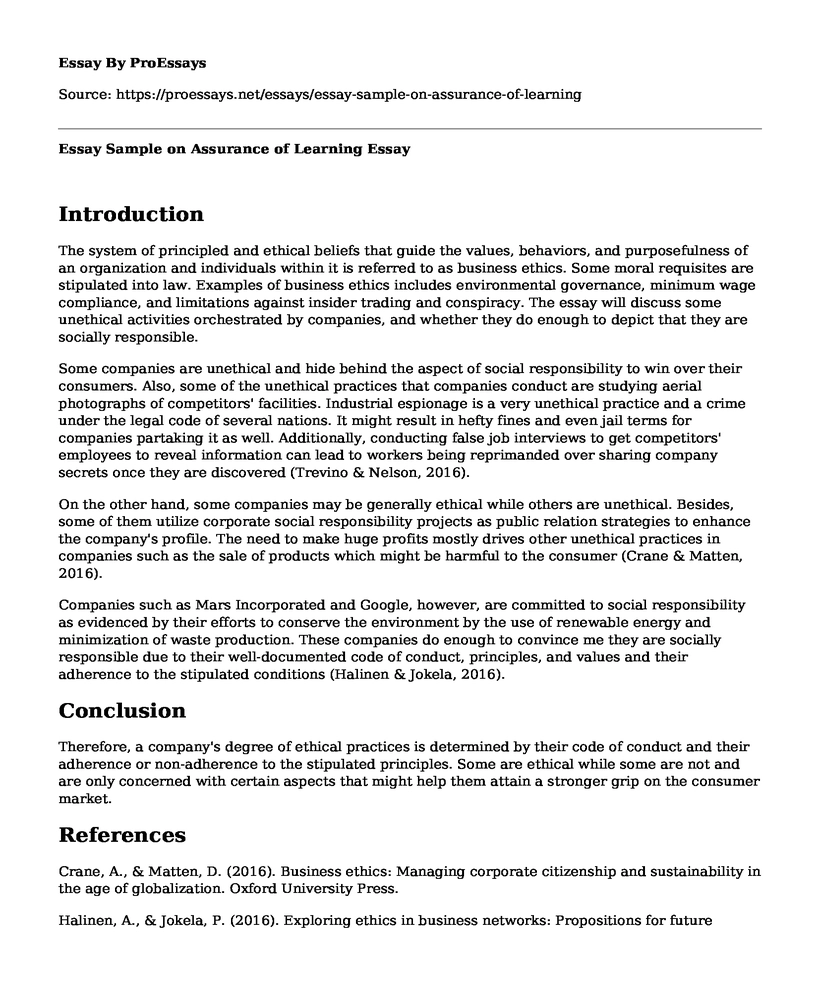Introduction
The system of principled and ethical beliefs that guide the values, behaviors, and purposefulness of an organization and individuals within it is referred to as business ethics. Some moral requisites are stipulated into law. Examples of business ethics includes environmental governance, minimum wage compliance, and limitations against insider trading and conspiracy. The essay will discuss some unethical activities orchestrated by companies, and whether they do enough to depict that they are socially responsible.
Some companies are unethical and hide behind the aspect of social responsibility to win over their consumers. Also, some of the unethical practices that companies conduct are studying aerial photographs of competitors' facilities. Industrial espionage is a very unethical practice and a crime under the legal code of several nations. It might result in hefty fines and even jail terms for companies partaking it as well. Additionally, conducting false job interviews to get competitors' employees to reveal information can lead to workers being reprimanded over sharing company secrets once they are discovered (Trevino & Nelson, 2016).
On the other hand, some companies may be generally ethical while others are unethical. Besides, some of them utilize corporate social responsibility projects as public relation strategies to enhance the company's profile. The need to make huge profits mostly drives other unethical practices in companies such as the sale of products which might be harmful to the consumer (Crane & Matten, 2016).
Companies such as Mars Incorporated and Google, however, are committed to social responsibility as evidenced by their efforts to conserve the environment by the use of renewable energy and minimization of waste production. These companies do enough to convince me they are socially responsible due to their well-documented code of conduct, principles, and values and their adherence to the stipulated conditions (Halinen & Jokela, 2016).
Conclusion
Therefore, a company's degree of ethical practices is determined by their code of conduct and their adherence or non-adherence to the stipulated principles. Some are ethical while some are not and are only concerned with certain aspects that might help them attain a stronger grip on the consumer market.
References
Crane, A., & Matten, D. (2016). Business ethics: Managing corporate citizenship and sustainability in the age of globalization. Oxford University Press.
Halinen, A., & Jokela, P. (2016). Exploring ethics in business networks: Propositions for future research. In Extending the Business Network Approach (pp. 333-356). Palgrave Macmillan, London. https://www.impgroup.org/uploads/papers/8204.pdf
Trevino, L. K., & Nelson, K. A. (2016). Managing business ethics: Straight talk about how to do it right. John Wiley & Sons.
Cite this page
Essay Sample on Assurance of Learning. (2022, Nov 19). Retrieved from https://proessays.net/essays/essay-sample-on-assurance-of-learning
If you are the original author of this essay and no longer wish to have it published on the ProEssays website, please click below to request its removal:
- Comparing and Contrasting Lecture and Demonstrator Teaching Styles
- Basics of Jean Piaget's Theory and Erick Erickson's Life Stages Theory Essay
- Essay Sample on Virtual and Online Learning
- Paper Example on Literacy Journey: Evolving with Time & Culture
- Nursing Students: Professional Behaviour & Dressing Well - Essay Sample
- Essay Example on From High School to Foreign Service: My Career Path
- Essay Sample on Online Learning: Gaining Popularity and Evaluated Advantages







